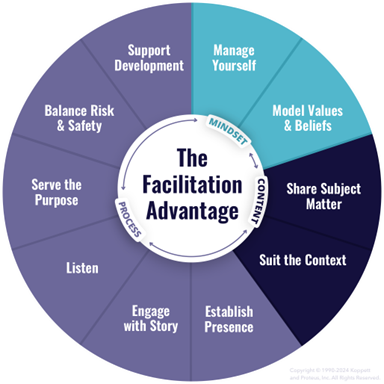ATD Blog
The Facilitation Advantage: 10 Key Skills to Strengthen Any Leader
Wed Apr 17 2024

My daughter has spent the last year as the editor-in-chief of her university’s newspaper. Navigating such a position at any time requires significant levels of equanimity, courage, organizational strategy, and people skills. In a year when campuses across the county have been roiled by demonstrations and political polarization, the job has sometimes seemed impossible. But she has succeeded.
As an organizational consultant, I have watched her leadership with amazement and admiration. What is her superpower? Her facilitation skills. She has been called upon to mediate conflict, build esprit de corps, manage change, and provide feedback and coaching. She has been committed to making it easier for others to work, to clearing the way for diverse perspectives, and to removing obstacles to efficient work.
What is facilitation? It simply means making things easier. Facilitation is often considered a specialized skill. But I believe that facilitation skills lie at the heart of great leadership, and that all of us benefit from acquiring and exercising these skills.
Facilitation looks like:
The subject matter expert tailoring their message to make it easier for their audience to understand it
The project manager transforming meetings from mundane to meaningful
The solutions architect guiding the team through an unexpected challenge
The senior leader creating the conditions for people to be candid, show vulnerability, and feel included
The nonprofit leader engaging volunteers and donors in a meaningful way
What are the specific facilitation skills that we can develop?
Here are ten key skills, which I call contributions.

1. Manage Yourself
Before we can engage effectively with others, we must be able to handle ourselves effectively. Manage your body, recognize your triggers and biases, and manage your self-talk so you can stay focused on your goal.
2. Model Values and Beliefs
Leaders hold privileged positions, handling high-stakes conversations and guiding groups. To be effective and get the results we want, we must demonstrate our values, not just profess them.
3. Share Subject Matter
When people look to us as a credible source of information and expertise, we can provide relevant knowledge and skills that inform the interaction. Even when others have the expertise, a baseline understanding helps us know what is important and relevant.
4. Suit the Context
Every group operates in an environment that’s uniquely theirs. It’s the facilitator’s job to understand content in relation to context and create a tailored experience.
5. Establish Presence
We trust and follow those who project confidence and credibility. Presence includes speaking and moving with authority, holding space for others, and giving and taking focus intentionally.
6. Engage With Story
Story is the oldest and most robust of communication and learning tools. Using storytelling skills deliberately can enliven a presentation, deepen understanding, increase retention, and build credibility.
7. Listen
We crave leaders who listen. It’s the foundation for all human connection. When people feel seen, heard, and understood, they are more likely to engage.
8. Serve the Purpose
The clock on the wall says you are 15 minutes behind on the agenda, but the conversation is lively and engaged. Do you stick to the plan or improvise? Beyond mere time management, “Serve the Purpose” is about knowing your goals and expanding your options in order to reach them best.
9. Balance Risk and Safety
Without a little push, without being presented with a challenge, we can remain stuck in our comfort zones, and opportunities can be missed. Hitting the sweet spot between risk and safety increases engagement and results.
10. Support Development
The value we offer to others goes beyond simply leading meetings or giving presentations well. In every interaction, we also have the opportunity to support others’ development. Great facilitators know how to offer feedback and coaching to move individuals and groups forward.
Consider these contributions and ask yourself:
Which do I feel strong in?
Where might I want to grow?
What specific context might benefit from my applying one or more of these skills?
When leaders have an understanding of these contributions, they can intentionally make choices that lead to better outcomes. Remember the foundational premise:
Anyone who leads can benefit from upping their facilitation game.
To learn more, join the session The Facilitation Advantage: Increasing Your People’s Communication and Connection Skills at the ATD International Conference & EXPO in New Orleans, Louisiana, on May 19–22, 2024.
